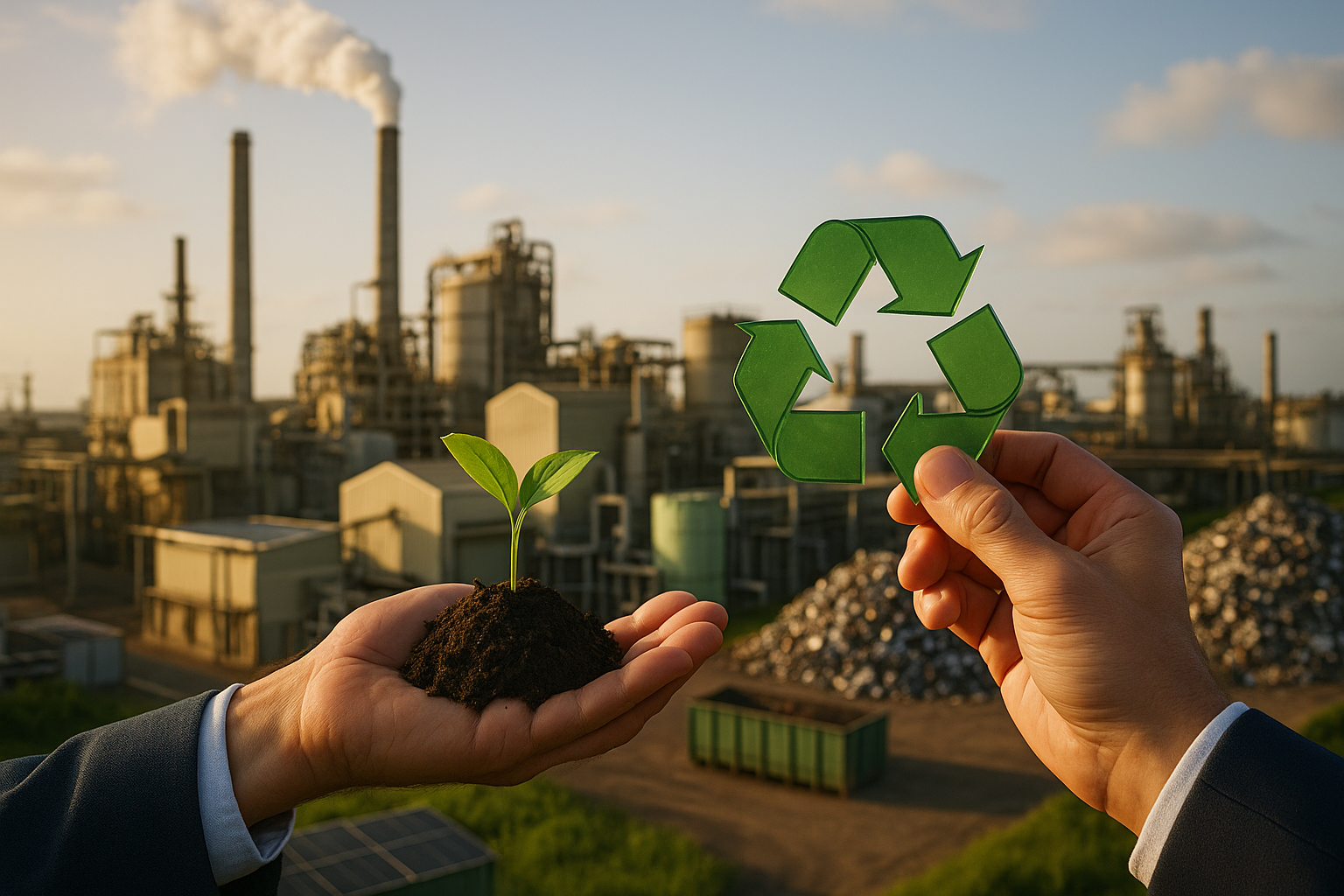Careers in Recycling: Skills, Certifications, and Economic Impact
The recycling industry offers diverse career paths that combine environmental stewardship with economic opportunity. As sustainability becomes increasingly important globally, recycling plants are evolving into sophisticated operations requiring specialized skills and knowledge. This growing sector not only helps address waste management challenges but also creates jobs and contributes significantly to the green economy.

The recycling industry has transformed from simple collection systems to complex operations that recover valuable materials from waste streams. This evolution has created numerous career opportunities for individuals passionate about environmental conservation while contributing to economic growth. As governments worldwide implement stricter waste management regulations and companies commit to sustainability goals, the demand for qualified professionals in this field continues to rise.
What Skills Are Essential for Sustainability Careers?
Technical expertise forms the foundation of many sustainability careers, particularly those in recycling operations. Mechanical aptitude is crucial for maintaining and operating sorting equipment, balers, shredders, and other machinery common in recycling facilities. Chemical knowledge helps professionals understand material properties and contamination issues that affect recyclability. Additionally, process engineering skills enable workers to optimize material recovery systems for maximum efficiency.
Beyond technical abilities, sustainability professionals need strong analytical skills to evaluate data, identify trends, and solve complex problems. Environmental science knowledge provides context for understanding the ecological impact of waste management decisions. Many positions also require proficiency in relevant software systems, including inventory management, logistics planning, and data analysis tools that help track material flows through recycling facilities.
Soft skills complement technical expertise in this field. Communication abilities are essential for educating stakeholders about proper recycling practices and coordinating with various departments. Project management capabilities help sustainability professionals implement new initiatives and manage improvement processes. Leadership skills become increasingly important as workers advance to supervisory and management positions within recycling operations.
What Certifications Enhance Recycling Career Prospects?
Industry-specific certifications significantly boost employability in the recycling sector. The Solid Waste Association of North America (SWANA) offers several relevant credentials, including the Managing Recycling Systems certification, which covers program planning, collection systems, processing facilities, and markets for recyclable materials. The Institute of Scrap Recycling Industries (ISRI) provides specialized training programs for various material streams, from electronics to metals recycling.
Environmental management certifications also hold value in this field. The LEED Green Associate credential demonstrates understanding of sustainable practices in the built environment, while the Certified Environmental Professional (CEP) designation indicates advanced knowledge of environmental regulations and management systems. For those focused on corporate sustainability initiatives, the Sustainability Excellence Associate (SEA) certification validates expertise in developing and implementing organizational sustainability strategies.
Safety certifications are particularly important in recycling plant operations. OSHA certifications demonstrate knowledge of workplace safety standards, while specialized training in hazardous materials handling may be required for certain positions. First aid and emergency response certifications are also valuable, as recycling facilities present unique safety challenges that require proper preparation and training.
How Do Recycling Plants Contribute to Green Economy Growth?
Recycling facilities serve as economic engines in communities by creating direct employment opportunities across various skill levels. According to industry research, recycling creates more jobs per ton of material processed than landfilling or incineration. These positions range from entry-level sorters and equipment operators to highly skilled maintenance technicians, environmental compliance specialists, and facility managers.
The economic impact extends beyond direct employment through the creation of secondary markets for recovered materials. By transforming waste into valuable commodities, recycling plants support manufacturing businesses that use these materials as inputs. This circular economy approach reduces dependence on virgin resource extraction while creating additional economic activity. The recycling industry also stimulates innovation in processing technologies and product design, further expanding economic opportunities.
Local economies benefit from recycling operations through increased tax revenue and reduced waste management costs. Municipalities save money on landfill tipping fees when materials are diverted to recycling streams. Additionally, recycling facilities often partner with local businesses and organizations to develop specialized collection programs, creating collaborative economic relationships within communities. These partnerships can lead to further job creation and economic development initiatives focused on sustainability.
What Career Paths Exist Within Recycling Plants?
Entry-level positions provide a foundation for career growth in recycling facilities. Material sorters, equipment operators, and collection personnel gain valuable hands-on experience with recycling processes. These roles typically require minimal formal education but offer opportunities to learn about material identification, contamination issues, and basic equipment operation. With experience and additional training, workers can advance to specialized technical positions or supervisory roles.
Mid-level technical and supervisory positions represent the next career step. Maintenance technicians ensure equipment reliability and efficiency, while quality control specialists monitor material purity and process effectiveness. Shift supervisors coordinate daily operations and manage teams of workers. These positions typically require several years of industry experience, technical training, and demonstrated leadership abilities. They serve as stepping stones to upper management roles within recycling operations.
Senior management and specialized expert positions represent advanced career opportunities. Facility managers oversee entire recycling operations, while environmental compliance managers ensure adherence to regulations. Business development specialists identify new market opportunities for recovered materials, and sustainability directors integrate recycling operations into broader environmental initiatives. These positions typically require extensive industry experience combined with relevant education, often including advanced degrees in environmental science, engineering, or business administration.
What Educational Pathways Lead to Recycling Industry Careers?
Formal education programs increasingly offer specialized training for sustainability careers. Associate degrees in waste management, environmental technology, or industrial maintenance provide practical skills directly applicable to recycling operations. Bachelor’s degrees in environmental science, engineering, or sustainability studies offer broader theoretical knowledge combined with technical skills. For management positions, business degrees with sustainability concentrations prepare professionals to balance environmental and economic considerations.
Vocational training and apprenticeship programs offer alternative pathways into the recycling industry. Technical schools provide focused training on equipment maintenance, electrical systems, and mechanical operations essential in recycling facilities. Apprenticeship programs combine on-the-job training with classroom instruction, allowing participants to earn while they learn. Industry associations and equipment manufacturers also offer specialized training programs on specific recycling technologies and processes.
Continuous learning remains essential throughout a recycling career as technologies and regulations evolve. Professional development courses in specialized areas like hazardous waste management, electronics recycling, or composting operations help workers adapt to changing industry needs. Online learning platforms and industry conferences provide opportunities to stay current with emerging trends and best practices. Many employers support continuing education through tuition assistance or paid training time, recognizing the value of knowledgeable staff in this dynamic field.
The recycling industry continues to evolve with technological advancements and growing environmental awareness. For those interested in combining environmental stewardship with stable career opportunities, recycling plants offer diverse paths that accommodate various educational backgrounds, skills, and interests. As sustainability becomes increasingly central to business operations and public policy, professionals with expertise in recycling and resource recovery will remain in high demand across the green economy.




